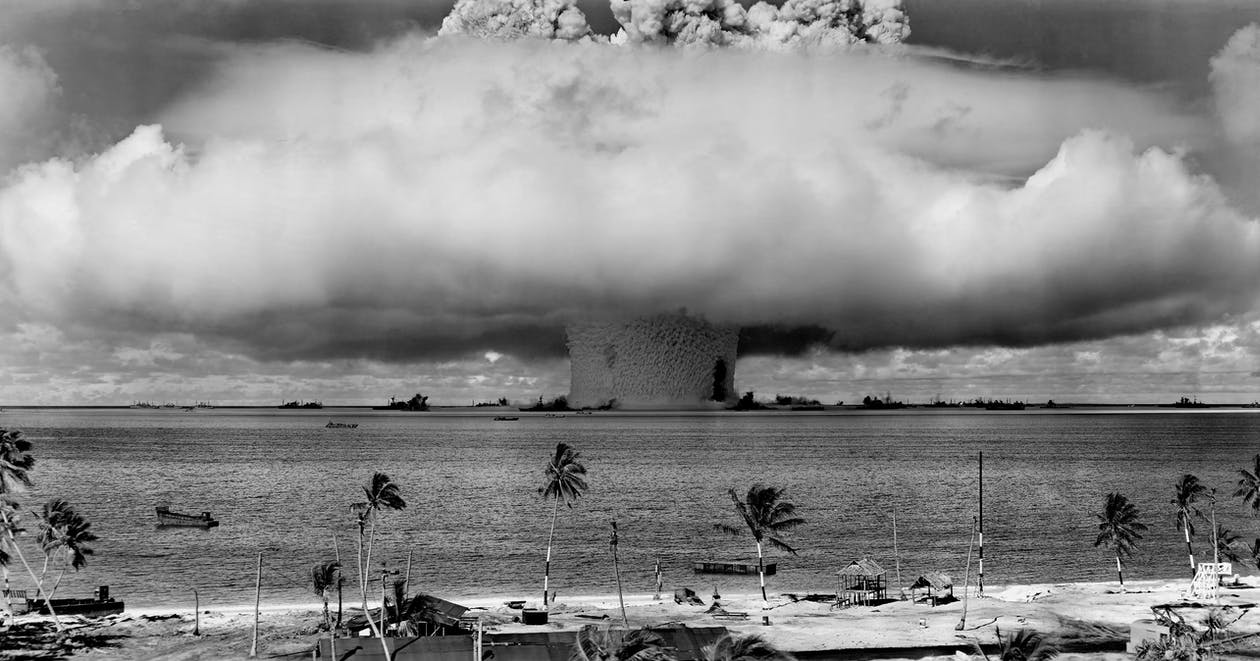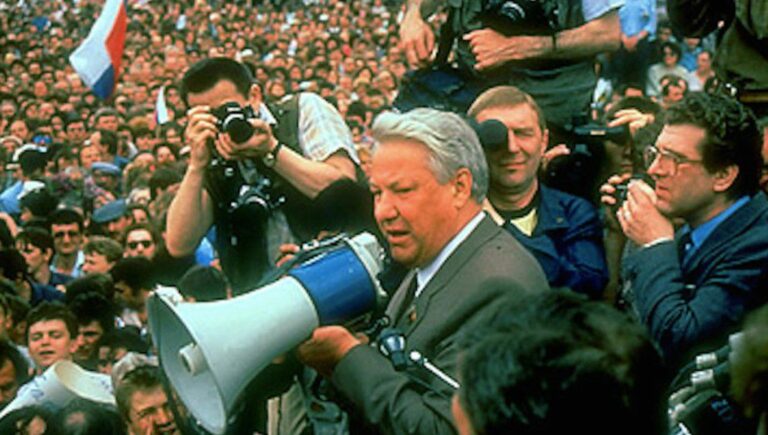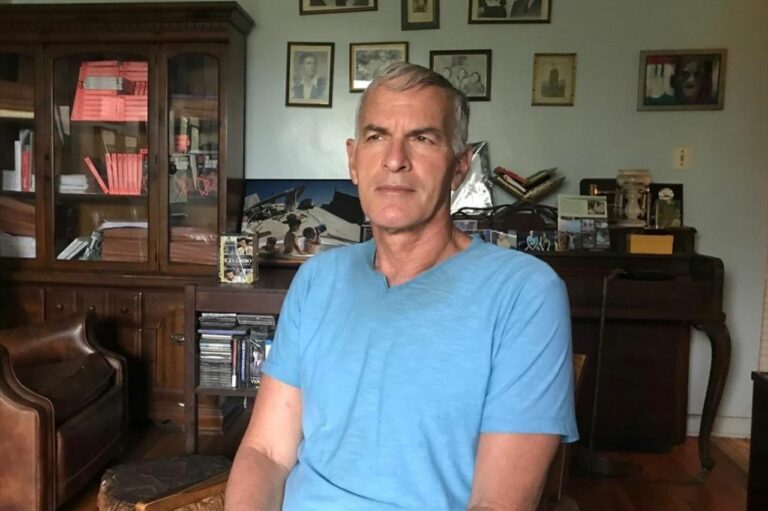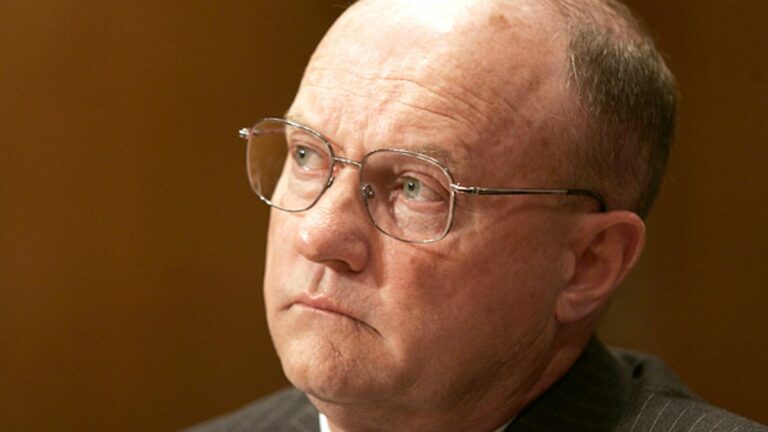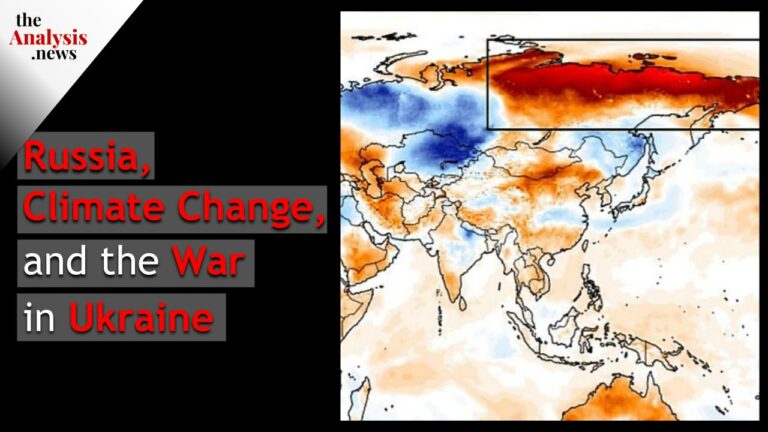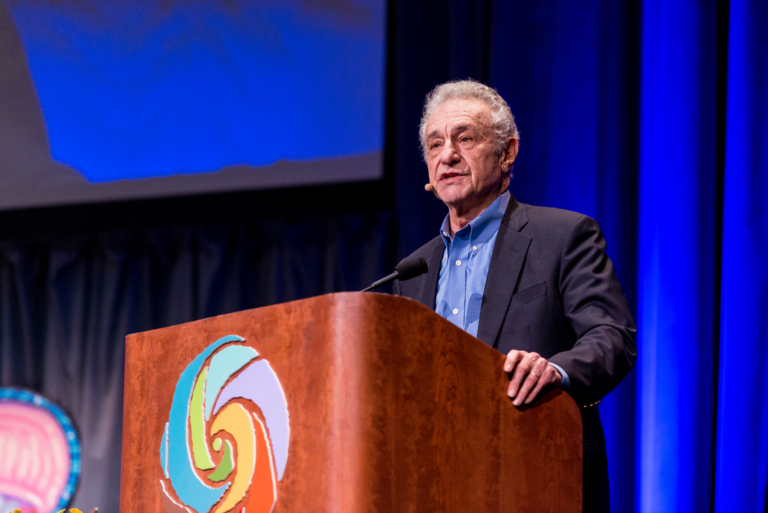Nuclear Winter – Alan Robock on RAI (4/5)
Mr. Robock says a nuclear war between the United States and Russia would produce so much smoke that temperatures would get below freezing even in the summertime, crops would die and there would be no food for the entire planet. This is an episode of Reality Asserts Itself, produced May 5, 2014.
STORY TRANSCRIPT
PAUL JAY, SENIOR EDITOR, TRNN: Welcome Back to The Real News Network. I’m Paul Jay. And welcome back to Reality Asserts Itself.
Jonathan Schell, the renowned author, also board member of The Real News Network, wrote in his Pulitzer Prize-nominated book The Fate of the Earth the following, speaking about the possibilities of a nuclear winter:
“The machinery of destruction is complete, poised on a hair trigger, waiting for the ‘button’ to be ‘pushed’ by some misguided or deranged human being or for some faulty computer chip to send out the instruction to fire. That so much should be balanced on so fine a point–that the fruit of four and a half billion years can be undone in a careless moment–is a fact against which belief rebels.”
Now joining us in the studio to talk about the potential effects of a nuclear winter is Alan Robock. He’s a distinguished professor of meteorology in the Department of Environmental Sciences and Rutgers University. He’s an editor of Reviews of Geophysics, the most widely read journal in the field. He was on the faculty at the University of Maryland, where he served as a professor and the state climatologist of Maryland from 1991 to 1997. He was the lead author for the Intergovernmental Panel on Climate Change, which was awarded the Nobel Peace Prize in 2007.
Thanks for joining us.
ALAN ROBOCK, LEAD AUTHOR, INTERNATIONAL PANEL ON CLIMATE CHANGE: Thanks for having me.
JAY: So you have done a lot of work and be preoccupied with the potential consequences of the use of nuclear weapons, even the small use. I have to say, when I first heard that, I was saying, like, who’s going to be around to see the weather report? But you have persuaded me this is not such an outrageous thing to be concerned about, in the sense that we all think if there’s a nuclear war, everything’s over, so why even consider the climate consequences.
ROBOCK: Nuclear bomb dropped on a city would be horrible. It would kill hundreds of thousands, millions of people, the blast, the fires, and the radioactivity. There would be a plume of radioactivity going downwind for a couple of hundred miles, and people would be affected by that in the decades to come. But it wouldn’t be a global catastrophe in terms of radioactivity. The people that were targeted would die, but the rest of the world, these direct effects would leave them alone. There are no nuclear weapons in the southern hemisphere, so half of the world really wouldn’t have that much of an effect of the direct use.
Yet it turns out that fires started by the bombs would produce so much smoke that it would go up into the atmosphere, block out the sun, and make it cold and dark at the Earth’s surface, killing the crops, and famine would threaten the entire planet. The amount of cooling depends on how much smoke goes into the atmosphere.
JAY: I mean, when you look at the recent news story of what’s been happening in the American Armed Forces, who are responsible for safeguarding and using nuclear weapons, I think it was only just in the last few days we saw that–what was it? Four or five senior commanders were fired, that people were passing competency tests without having actually any real knowledge, a whole level of corruption and inefficiency. And these are the people guarding American nuclear weapons. I don’t know whether it’s fair to say what’s happening in Russia would be worse, but countries that have less resources you would think might even have less supervision. So it’s not so much necessarily about a full-scale war, but if you listen to Jonathan’s quote, it could be a few that are fired in error. What would be the effect of that? And you’re saying the effect climate-wise can be very significant.
ROBOCK: A full-scale war between the United States and Russia would produce so much smoke that temperatures would get below freezing even in the summertime. And that’s why we call it a nuclear winter. Crops would die and there would be no food for the entire planet. So that idea, research done jointly by American and Russian scientists in the 1980s, helped end the arms race. Both Reagan and Gorbachev learned about the nuclear winter results from scientists–and I have quotes of both of them saying that helped them decide to change the arms race. And it made people focus on these horrible direct effects of nuclear weapons. We had about 70,000 weapons then, and the number’s been going down ever since. And in a few years we’ll have about 5,000 nuclear weapons on the planet.
Now, about eight years ago, Brian Toon and Rich Turco met me at a conference, and they said, somebody asked us what would happen if there was a nuclear war between two of these new nuclear states, say, India and Pakistan. They each have about 100 nuclear weapons. What if each of them used, say, half of their arsenals on the other country? And Brian says, I thought–I told them, not much, and then I did a calculation. And he was surprised how much smoke would be generated–5 million tons of smoke could be generated. I said, oh, that’s a lot. I said, so who’s going to calculate how the climate will respond? He said, well, we thought maybe you would. And one of my students, Luke Oman, was ready to do that, because he was doing research on volcanic eruptions. And so we put black soot into the upper atmosphere instead of sulfur from volcanoes and calculated the response. And we were shocked. We were shocked that the temperature would fall to temperatures colder than the Little Ice Age within a few months.
JAY: Globally.
ROBOCK: Globally averaged. And in some places it would be much colder. Over the land it would cool more than over the oceans.
And so that–and the smoke would be heated by the sun and lifted into the stratosphere, the layer above which we have rain, and it would last for more than a decade. Nobody had ever calculated that before. Now we’re able to use modern climate models and modern computers to do the calculations. Nobody had that available. The calculations done on the Cray computer in the 1980s is the Cray is much slower than your iPhone. And so we were very limited in terms of how much we could do then. So now we use modern technology. And we said, that’s very shocking.
And then–so the question is–it wouldn’t be nuclear winter. Temperatures would be a couple of degrees Celsius colder. How would it affect agriculture? And so, recently my student Lili Xia and I and some other colleagues took the amount of temperature change and precipitation change in the areas of the world where most of the food is grown–in China and the United States–and we saw how much would that affect the agriculture. And we were very surprised. Rice production would go down by 20 percent for five years and 15 percent for a decade. Wheat production in China would go down by 40 percent for five years and 20 percent for a decade. Soybean and corn production would go down by about 20 percent in the Midwest U.S. This means the amount of food available in China would be the same as what they had when they had several hundred million fewer people.
Imagine this happening. The world food trade would grind to a halt, people would hoard their food, and there would be huge disruptions. Now, the Arab spring, which started a couple of years ago, was triggered and the rebellion in Syria were triggered by food shortages. Food prices doubled. There was a drought in Russia and they stopped exporting food. And so we already see major disruptions in terms of world security by small disruptions of food. And we calculated that maybe a billion people would be threatened with starvation from this, quote, small nuclear war using much less than 1 percent of the current arsenal.
JAY: Now, there has been use of nuclear weapons. The United States used them against Japan at the end of World War II. There was a lot of open-air testing during the 1940s, the late ’40s, and during the 1950s. Have you been able to tell anything from that data? Did that have any effect on the weather?
ROBOCK: It’s the smoke from the fires that goes up and blocks out the sun. So you need something to burn. A city, an industrial area has all kinds of stuff. We’d go into a room and calculate how much plastic, how much wood, how much paper and stuff, and we’d calculate how much smoke would be generated. All the testing that was done was not dropped on cities; it was dropped in the desert, on remote islands, so there was nothing to burn, basically, and so there was very little smoke generated. So you wouldn’t expect it from that.
JAY: So it’d be Japan that would be the test.
ROBOCK: Now, Hiroshima and Nagasaki had a very small bombs, 15 kiloton bombs. The typical ones now are 100 or 500 kilotons. And we calculated how much smoke would come from a very small bomb on Hiroshima. And that’s what we used in our calculations for India and Pakistan. We assumed they would use these small bombs, because that’s–we know, is easy to make. They may have much bigger bombs, in which case the effects would be much larger.
There were a number of cities bombed in Japan with firebombing, genocidal firebombing during World War II. And it wasn’t the two bombs dropped on Hiroshima and Nagasaki that ended World War II; it was the Russians coming in.
JAY: No, I didn’t say it ended; I said at the end of. We’ve done a whole show on that it wasn’t the bombs that ended the war. Yeah.
ROBOCK: Yeah, I just wanted to make that point.
And so I gave a talk about this a week ago, and somebody said, what about all the cities that did burn in Japan? And so this morning, it just happens, I got out the data on land temperature, and in 1945, global temperature went down by a couple of tenths of a degree Celsius for several years. Now, I don’t know. That could have just been random variations or it could have been other causes. So it’s the beginning of my research. But the amount of smoke that would’ve been generated may have been 10 percent of our scenario in India and Pakistan. So I’ve got to quantify it better. But there’s–certainly possible that there was a small climate change because of the smoke from that bombing.
JAY: And what about, you know, a few bombs, a handful of bombs goes off, or one or two or something’s let loose by mistake and they’re able to contain–it doesn’t turn into a big, full-scale war?
ROBOCK: If it was dropped on a city that burned, it would produce smoke, but still that wouldn’t be enough to have large-scale global climate change. However, once a nuclear war starts, you have electromagnetic pulse, you have disruption of communications, you have panic, and it’s hard to imagine a scenario where it will be contained and stopped.
Now, if it was a mistake and, you know, something was launched, a missile was launched, and everybody knows it was a mistake, and whoever it was launched against promised not to retaliate, you would–
JAY: Which is assuming pretty rational heads.
ROBOCK: –yeah–you could suck that up, maybe. But I’m worried about the missiles in the silos, where these people who are bored their whole lives and cheat on the exams. If you detect a missile coming in, if you don’t launch those, they’re lost. And so they’re now set on launch-on-warning. And that makes it very dangerous. The submarines and the airplanes are pretty invulnerable, and so you don’t have to launch immediately. You have more time to think about it. So that would make the world much safer, to take us off this launch-on-warning and get rid of our land-based missiles.
JAY: Now, you’re arguing, I know, for abolition, that you cannot–the climate, the globe can’t risk any level of nuclear warfare. Is that right?
ROBOCK: Ultimately that’s the goal. But in the shorter term, look at how many weapons the nine countries have that have nuclear weapons. The U.S. and Russia each have thousands. What about the other countries, China, U.K., France? You know how many they have?
JAY: And Israel.
ROBOCK: Well, I’m getting to them, but–and Israel. China, U.K., and France have about 200 weapons each. Israel has 100–but we don’t know how many Israel has. But they chose to stop at 200. They could make as many as they wanted. How many do you need to deter your enemy from attacking you? How many do you have to put on their capital city? You know, one. So–maybe two if it misses.
JAY: Well, their counterargument’s going to be–is that antimissile protection, the only way you get through it is by throwing a lot of stuff, so even if they’re able to knock out a certain amount, something gets through.
ROBOCK: But there is no antimissile protection. ABM system doesn’t work and it’s easily overcome.
So if the U.S. and Russia both got down to 200 each, just like all the other countries in the world, that would prevent nuclear winter. Even if an accident or something happened, you would get climate change of a few degrees, but it wouldn’t threaten the whole world with death by starvation. So that would be the first step is for the U.S. and Russia to get rid of 90 percent of their weapons. And that would still maintain their deterrence.
Now, the whole idea of deterrence and whether it’s really–would really work and whether the threat of genocide is enough–you have to believe that people would do it to deter it. We wrote–Brian Toon and I wrote an article called “Self-Assured Destruction”–it’s not mutual assured destruction; it’s SAD, it’s not MAD. If country A attacks country B, and country B does nothing, everybody in country A dies from starvation. So it would be suicide. And that’s the situation now between the U.S. and Russia. But if weapons exist, they can be used, as Jonathan Schell said, by accident, by some high school kid hacking into the computers, by some mistake. And so the only way to prevent it is to get rid of them. And that’s the ultimate goal.
JAY: Now, the people that have power to make such decisions in Moscow and in Beijing and in Washington, they do know all this stuff, but there doesn’t seem to be much motion in this direction.
ROBOCK: There were two conferences in the last year on the humanitarian impacts of nuclear weapons, one in Oslo in March in 2013, and one in Mexico in February 2014. And 130 to 140 countries came, and came to this conference, including a couple of the nuclear nations–India and Pakistan were there. But the P5, they call them, the permanent members of the Security Council, boycotted it. But the rest of the world understands that a war between the nuclear powers threatens them because it would be a global climate effect. The smoke would go around the world, would last for many years, and it would affect everybody. It doesn’t matter where the bombs are dropped. And so they’re pressuring much more the countries that have nuclear weapons. And they claimed that we’re not going to come because this disrupts from the process that we’re going through to get rid of weapons, of course, which doesn’t exist. And so a third meeting’s going to be held in Vienna, Austria, this fall. And I think this pressure from the rest of the world is really building up pressure on the countries to pay attention to this.
JAY: The work you’ve been doing on the dangers, the climate consequences of any kind of nuclear war, even the smallest one, has attracted a lot of attention, and particularly it’s interesting it attracted the attention of Fidel Castro, who you spoke to about this. What’s the story there?
ROBOCK: Fidel fell down and broke his shoulder and his arm and had intestinal problems and gave up control of the country to his brother Raúl several years ago. But then he got better and had spare time on his hands he never thought he would have. And somehow he discovered my work on nuclear winter. He contacted me through a former graduate student who’s Cuban and invited me down to Havana to talk about climate change.
And when I got there, they said, do you mind if the Comandante comes to your talk? No. And there was a room with 150 people, and he walked in, and I gave an hour-long lecture about nuclear winter. He said, do you mind if we videotape it? No. And it was shown on nation-wide television the next day.
And he–next week on his blog, he said–he repeated exactly what I said, that we have to get rid of nuclear weapons to avoid the possibility of climate change caused by them. He got it. Now, unfortunately, he does–well, maybe fortunately–he doesn’t have nuclear weapons. But he can’t do anything about it now. But as you know, the Cuban missile crisis in ’62 was the closest we’ve come to a global nuclear war.
The next day I was taking a private tour around Havana, and we walked into a hotel, and to the bar. There was a TV. I said, can we see if I’m on? And there was a Julia Roberts movie being shown, and the bartender changed the channel, and there I was giving a lecture. What that taught me is you need a movie with Julia Roberts to engage people, not a professor giving a lecture. And so I’m trying to get a Hollywood screenwriter to write a really good, compelling movie so people will watch it to find out about–you know, this lovely Russian scientist falls in love with an American one, and they try to warn them, and meanwhile along the Kashmiri border there’s been a disturbance. And so that’s a better way to communicate, through people’s feelings, rather than just through intellectually.
JAY: So did you get a chance to sit down and discuss all this with Fidel?
ROBOCK: After my talk, they brought me into this room, this conference room with a table a bit longer than this, and I sat for half an hour across from the table, talking with him. He asked me questions. They brought in some photos they had just taken and printed. He autographed them and gave them to me. His son, also Fidel Castro (some people call him Fidelito), is my age. He’s the president’s science adviser. And he–.
JAY: He’s a fairly serious scientist, as I understand.
ROBOCK: He’s a nuclear physicist. And so he was there, and his other son, Antonio, who’s a medical doctor, his wife. And I talked to them. And so it was such a surreal, strange experience after that. So that happened, like, two and a half years ago.
And a year and a half ago, I went back to Cuba as part of a delegation of the American Association for the Advancement of Science to try and expand scientific cooperation. And the last day, Fidelito invited me to lunch at this very nice restaurant, and I said, last time I was here, I didn’t know I was going to get to meet you or your father, but I have a couple of Rutgers baseball caps for you. And he said, which one’s for my father? I said, well, I don’t care. Just give him one of them and keep the other. He said, well, maybe we’ll let him decide. I said, what? He said, yeah, we’re going to go meet him. And I spent three and a half hours across the table from Fidel the second time, telling his whole life story, being videotaped by them, about his earliest childhood memory, how he got in fights with his teacher, about the Bay of Pigs invasion, the Cuban missile crisis, what he thought about John Kennedy, and Dobrynin gave the best–his autobiography gave the best story of the Cuban missile crisis, and what movies he liked. And it was just amazing. I couldn’t believe it. So that was the second time.
And I asked him: can we have a conference in Havana on the 50th anniversary of the Cuban missile crisis, where scientists would talk with politicians to inform them about this? It would really get a lot of attention. And he said yes, but it never happened. I think he got sick afterwards. Anyway, it never happened. But I was trying to use that as a way to publicize it.
JAY: Okay. In the next segment of our interview, we’re going to kind of wrap up the discussion for now and talk about just what needs to be done in terms of climate change and whether one–just how urgent and potentially apocalyptic is it.
So please join us on The Real News Network for the final segment of our series of Reality Asserts Itself with Alan Robock.
END
Podcast: Play in new window | Download
